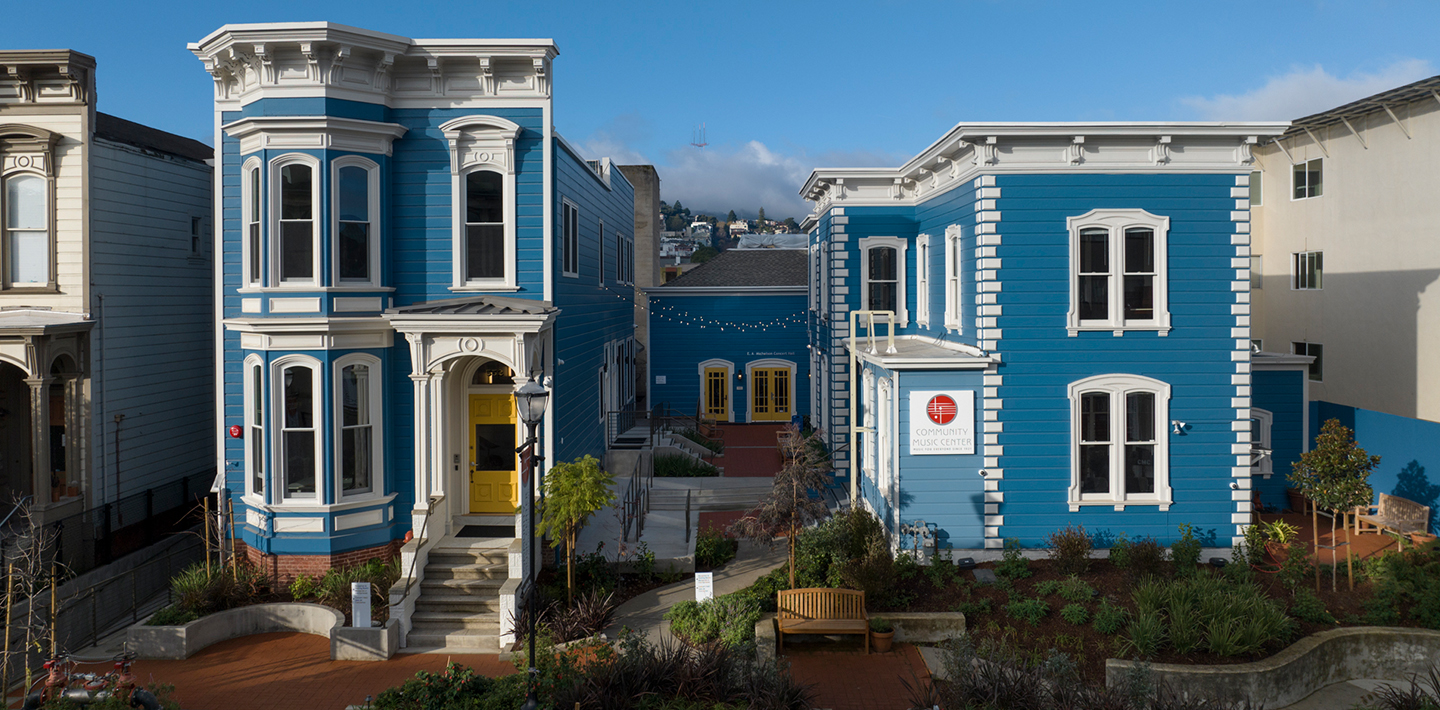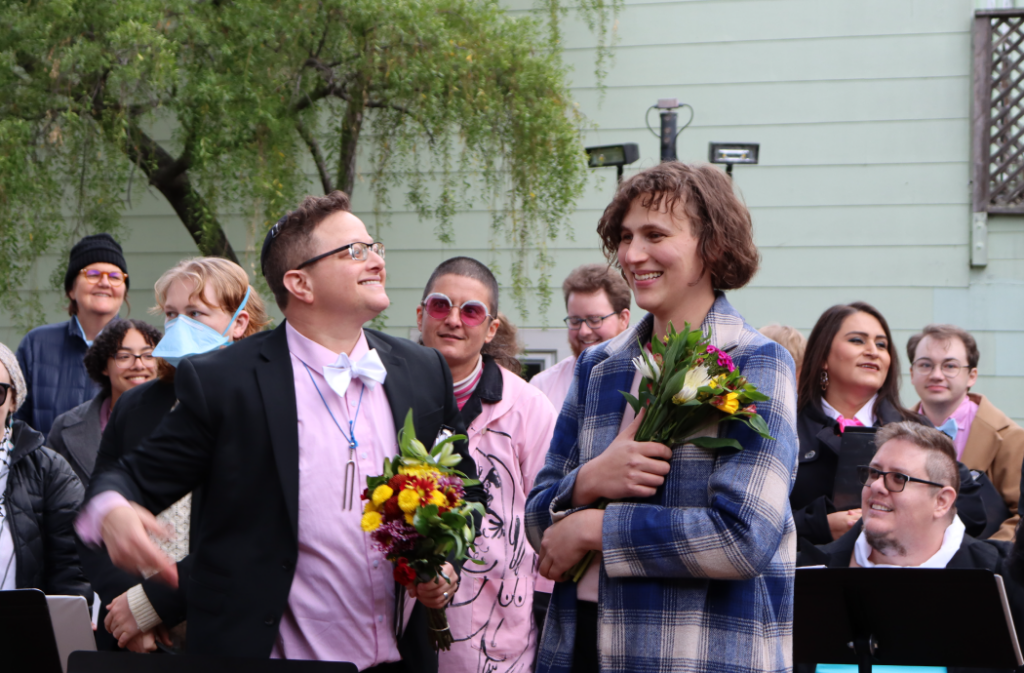As performer, activist, songwriter and scholar, Bernice Johnson Reagon so poignantly summed up: “when we sing, we announce our existence.” The ethos that music provides all of us a necessary tool for self expression, transformation, and community-building is one that Community Music Center holds dear in its mission, vision, and values. The tuition-free New Voices Bay Area TIGQ Chorus—a mixed-voice choral ensemble for singers who self-identify as transgender, intersex, or gender-queer (TIGQ)—is an embodiment to those goals, building a creative, empowered, joyful space for our TIGQ community, encouraging voices that have been silenced or shamed to grow and be heard, and to changing how the world thinks about gender identity and music.
Join us in meeting Co-directors Reuben Zellman and Jessalynn Levine beyond the merits of their bios, as they shared about what drives and inspires them as artists, educators, and leaders.
Both Reuben and Jessalynn recall memories of singing in school choirs and plays as young children that sparked joy in music-making. Jessalynn remembers trying out conducting her eighth grade choir at age 11, a transformative inspiring moment that led her down the choral path. “I wanted to be a singer since I was a small child,” recollects Reuben. “There was no question about it. It’s just what I wanted to do. Nothing made me happier, and that is true to this day.”
But alongside his early love for music, Reuben also expressed how discouraging he found the rigidity of tradition to be in his musical expression, which ultimately sparked the genesis for New Voices Bay Area:
“Because of being intersex, I was a very gender nonconforming kid. And at that time, there were very strict rules about how you presented your gender if you wanted to participate in the performing arts. And I really just was not welcome…I didn’t really start singing seriously until my late thirties. It is still the thing I most love. I don’t expect that to change.
I didn’t want what had happened to me to happen to other people because I know the cost. And I wanted people to have an environment where they weren’t being judged or regulated on things that didn’t matter if they wanted to be there. So that’s why we did this.”
Reuben’s steadfast love for music and hope despite disappointment has been a driving force and inspiration for the ensemble. Both Directors bring a strong desire to create to their work—not just in making music, but to create a safe space for people to experience that magic and connect with one another through the process—a process that can start at any age or level of experience.
JL: “There is only a small group of people on Earth who have access to everything that they need to do all the music that is in them, but very few of us are in that circumstance…Getting to be a person who can swing that door open for someone is very inspiring to me. I really like that moment—and a lot of teachers will say the same thing—where you know you’ve made that connection. They get it now. Now they know they can do it. Now they know they belong here. It’s really precious to witness.”
RZ: “I would say to build on that, it’s finding that moment in the artistic process where there’s a realization that if we come together as an ensemble, we can create something that we wouldn’t be able to create alone. People come to any choir for all sorts of reasons, everyone brings their own experience and expectations with them, especially in our TIGQ choir. They don’t feel like there’s a space for them, and so they don’t have the same access to that experience. So it’s really incredible to create that for people, where a sense of belonging is a prerequisite and a necessity to have that sort of experience—with no audition required.“
The care that both Reuben and Jessalynn take in creating these spaces also spills into the other aspects beyond conducting, like selecting repertoire and leading rehearsals with intention.
In selecting repertoire, they consider a great number of factors to make sure everyone feels a sense of support and inclusion that allows them freedom to explore. First and foremost, they aim to elevate the compositions of trans, intersex, and non-binary composers. They combine music that the singers love, music that will inspire the audience, as well as works from the traditional choir canon like music from the Renaissance or Baroque period, such as their recent collaboration with the Handel Opera Project’s production of The Magic Flute. “There is no reason that a trans choir should be or needs to be limited away from the depth and beauty of that music. And it’s important that people see us performing that kind of music, in addition to singing music that’s important to us and music that has a message.”
Another consideration in their programming and direction is flexibility, selecting repertoire that allows for voices of all ranges and levels of experience to feel comfortable and change as needed. A rehearsal model with two Co-Directors supports that fluidity, and allows for people to shine in a solo, breakout into various groups, or sing within the full ensemble. “We consider what voices we have available to us, and make space for things like how one feature of our choir is that since it is for people whose voices are changing in all sorts of ways and their identity with their voice is changing all the time. We allow singers to experiment with what part they sing, whereas many choirs might frown upon that.”
Reuben and Jessalynn also pay close attention to the music’s text and lyrics to make sure that singers will be comfortable performing it. They don’t program religious music, and a lot of choral music reinforces binary gender roles in some way. “Once you start looking for it, it’s raining down on you. ‘This woman is as delicate as a flower.’ Well, we’re not singing that,” Reuben laughs. Unfortunately, that removes a lot of otherwise wonderful pieces, so small text changes to works are often made as a solution, but a lot gets eliminated when a more discerning eye examines the message of a text.
This kind of thoughtfulness isn’t just for singers, either. It reaches the audience and ripples into a larger community as well. Jessalynn recalls an incredible mentor early in her career, who taught about performing to impress versus singing to inspire. “It’s really stuck with me: the idea of impressing an audience with skill being to teach an audience about you, saying ‘this is what I have to offer,’ versus singing to inspire, which is to teach an audience about themselves. [When that happens] you leave a changed person, not just about what that other person is, but about your view of yourself and your view of the world.”
The impact of this musical mirror is even more prescient now than ever, as our social and political landscape aims to erase trans voices and denigrate the arts and its power as a tool for community and advocacy. “Just sending a choir of 40 transgender people into the street is highly political.” remarks Reuben. “It reveals the kind of internalized messages that a lot of people are walking around with. It’s very recent that people have realized that trans people can do all the normal human things, and showing up in public as ourselves is a big deal for a lot of people.”
The influence of folk music is also an inspiration for getting that message out into the world for the group, as a way for people to come together in expression and activism. “We very much focus on hope. We always have audience sing-alongs in each of our concerts,” extending joyful participation to those that originally just came to observe in the groups welcoming fashion. “A lot of people—everybody, really—feel silenced in some way. That’s even more true in terms of singing in the trans community. So [we] feel like what we’re doing is more necessary now than it even has been.”
This community-building through music isn’t one-directional. Both directors express their gratitude for the privilege to create and share queer space with the group, and how it inspires them to create more of these spaces beyond San Francisco. “What we provide our members we sort of provide to ourselves as well. It creates community for me too,” Jessalynn comments. “At a time where that is frighteningly more necessary and important…I can leave rehearsal feeling so powerful, being so impacted by the simple fact that there was not a space for queer people exclusively to come together and sing in a space that felt safer for them. That didn’t exist one day, and it did exist the next day.” Both are also constantly inspired by the diversity of their community of singers, from the identities and experiences that people bring, to the goals that they have, not just for their voices but in their own lives and out in the world. CMC is proud to be part of this vital work, and will always be a safe space for everyone to learn, grow, and express themselves through the act of music.
If you’re interested in joining the community of New Voices Bay Area TIGQ Chorus, singers are welcomed at any point, no experience necessary. Learn more about enrolling here.
Be sure to check our event calendar and join NVBA at an upcoming performance!



